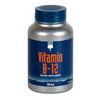Drug Name
Vitamin B-12
Drug Uses
Vitamin B-12 is a water-soluble vitamin that is stored in the liver. Vitamin B-12 is a collective term for a group of cobalt-containing compounds known as corrinoids. The principal cobalamins are cyanocobalamin, hydroxocobalamin and the two coenzyme forms of Vitamin B-12, methylcobalamin and 5-deoxyadenosylcobalamin (adenosylcobalamin). Cyanocobalamin is the principal form of the vitamin used for fortification of foods and in nutritional supplements. Vitamin B-12 is also called cobalamin because it contains the metal cobalt. Vitamin B-12 is bound to the protein in food. Hydrochloric acid in the stomach releases B-12 from proteins in foods during digestion. Hydroxocobalamin is a man-made form of Vitamin B-12. The advantage using hydroxocobalamin is the lack of adverse effects seen with the nitrites such as methemoglobinemia and hypotension. It works by exchanging the hydroxy group for cyanide to form the non-toxic cyanocobalamin (Vitamin B-12).
How to take
Use Vitamin B-12 as directed by your doctor.
- Take Vitamin B-12 by mouth with or without food.
Drug Class and Mechanism
Vitamin B-12's main functions are in the formation of red blood cells and the maintenance of a healthy nervous system. Vitamin B-12 is an especially important vitamin for maintaining healthy nerve cells and it aids in the production of DNA and RNA, the body's genetic material. Cyanocobalamin works to promote normal growth and development, helps with certain types of nerve damage, and treats pernicious anemia. Vitamin B-12 helps in the formation of red blood cells and in the maintenance of the central nervous system. Nerves are surrounded by an insulating fatty sheath comprised of a complex protein called myelin. B12 plays a vital role in the metabolism of fatty acids essential for the maintenance of myelin. Prolonged B12 deficiency can lead to nerve degeneration and irreversible neurological damage.
Vitamin B-12 is essential for the proper production of blood platelets and red and white blood cells, the manufacture of vital substances needed for cell function, and the metabolism of nutrients necessary for cell growth. It participates in a variety of cellular reactions to release energy from carbohydrates, fats and protein. Vitamin B-12 helps maintain the myelin sheath that insulates nerve fibers from each other. People with Vitamin B-12 deficiency show irregular destruction of the myelin sheaths, which eventually causes paralysis and death. Vitamin B-12 levels decrease with age and various measures of cognitive impairment are associated with reduced B-12 status. The most important use of Vitamin B-12 is to treat the symptoms of pernicious anemia. Vitamin B9 (folate) and vitamin B12 are critical to the health of the nervous system and to a process that clears homocysteine from the blood. Vitamins B-12, B-6, and B-9 (folate) work closely together to control blood levels of the amino acid homocysteine. Elevated plasma homocysteine concentrations are considered to be a risk factor for vascular disease and birth defects such as neural tube defects.
Missed Dose
If you miss a dose of Vitamin B-12 and are taking it regularly, take it as soon as possible. If it is almost time for your next dose, skip the missed dose and go back to your regular dosing schedule.
Storage
Store Vitamin B-12 at room temperature, between 68 and 77 degrees F (20 and 25 degrees C). Store away from heat, moisture, and light. Do not store in the bathroom. Keep in a tight, light-resistant container. Keep Vitamin B-12 out of the reach of children and away from pets.
Warnings/Precautions
- Vitamin B-12 is considered safe and non-toxic. No toxic or adverse effects have been associated with large intakes of vitamin B12 from food or supplements in healthy people.
Possible Side Effects
Check with your doctor if any of these most common side effects persist or become bothersome:
Dry and splitting hair; gingivitis (inflammation of the gums); bleeding gums; rough, dry, scaly skin; decreased wound-healing rate; easy bruising; nosebleeds; weakened tooth enamel; swollen and painful joints; anemia; decreased ability to fight infection; possible weight gain because of slowed metabolism.
More Information
Vitamin B-12 deficiency occurs when there is an abnormally low level of Vitamin B-12 absorbed in the body. The absorption of dietary Vitamin B-12 occurs in the small intestine and requires a secretion from the stomach known as intrinsic factor. If intrinsic factor is deficient, absorption of Vitamin B-12 is severely diminished. Vitamin B-12 deficiency can be a factor in a variety of different health conditions and disorders. B12 deficiency inhibits of severy decrease the bodies ability to produce blood, increases blood cell destruction, and is very harmful to the nervous system. Characteristic signs of B-12 deficiency include fatigue, weakness, nausea, constipation, flatulence (gas), loss of appetite, and weight loss. Symptoms of severe Vitamin B-12 deficiency (regardless of the cause) may include burning of the tongue, fatigue, weakness, loss of appetite, intermittent constipation and diarrhea, abdominal pain, weight loss, menstrual symptoms, psychological symptoms, and nervous system problems, such as numbness and tingling in the feet and hands.



